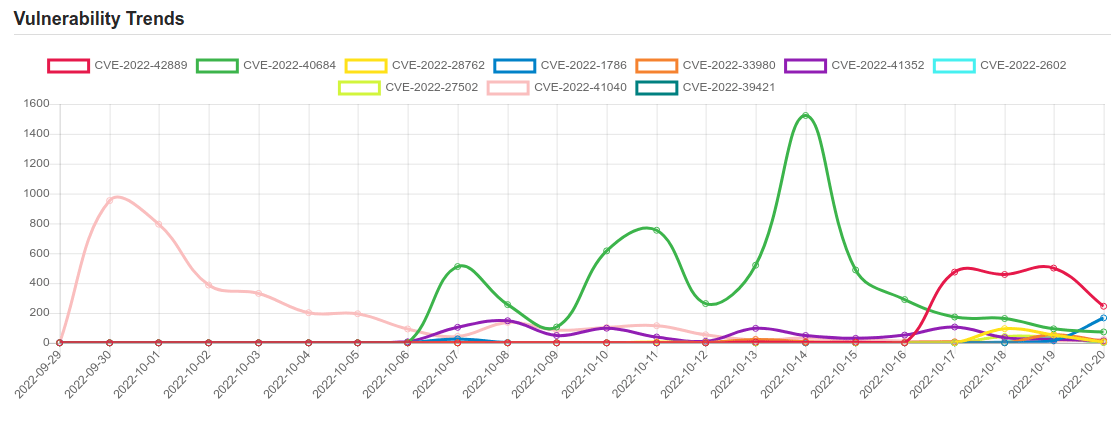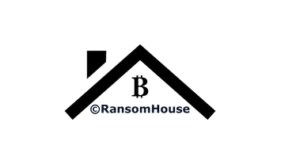Daily Vulnerability Trends: Fri Oct 21 2022

| CVE NAME | CVE Description |
| CVE-2022-41852 | Those using JXPath to interpret untrusted XPath expressions may be vulnerable to a remote code execution attack. All JXPathContext class functions processing a XPath string are vulnerable except compile() and compilePath() function. The XPath expression can be used by an attacker to load any Java class from the classpath resulting in code execution. |
| CVE-2021-21551 | Dell dbutil_2_3.sys driver contains an insufficient access control vulnerability which may lead to escalation of privileges, denial of service, or information disclosure. Local authenticated user access is required. |
| CVE-2022-26809 | Remote Procedure Call Runtime Remote Code Execution Vulnerability. This CVE ID is unique from CVE-2022-24492, CVE-2022-24528. |
| CVE-2022-21628 | Vulnerability in the Oracle Java SE, Oracle GraalVM Enterprise Edition product of Oracle Java SE (component: Lightweight HTTP Server). Supported versions that are affected are Oracle Java SE: 8u341, 8u345-perf, 11.0.16.1, 17.0.4.1, 19; Oracle GraalVM Enterprise Edition: 20.3.7, 21.3.3 and 22.2.0. Easily exploitable vulnerability allows unauthenticated attacker with network access via HTTP to compromise Oracle Java SE, Oracle GraalVM Enterprise Edition. Successful attacks of this vulnerability can result in unauthorized ability to cause a partial denial of service (partial DOS) of Oracle Java SE, Oracle GraalVM Enterprise Edition. Note: This vulnerability applies to Java deployments, typically in clients running sandboxed Java Web Start applications or sandboxed Java applets, that load and run untrusted code (e.g., code that comes from the internet) and rely on the Java sandbox for security. This vulnerability does not apply to Java deployments, typically in servers, that load and run only trusted code (e.g., code installed by an administrator). CVSS 3.1 Base Score 5.3 (Availability impacts). CVSS Vector: (CVSS:3.1/AV:N/AC:L/PR:N/UI:N/S:U/C:N/I:N/A:L). |
| CVE-2022-26134 | In affected versions of Confluence Server and Data Center, an OGNL injection vulnerability exists that would allow an unauthenticated attacker to execute arbitrary code on a Confluence Server or Data Center instance. The affected versions are from 1.3.0 before 7.4.17, from 7.13.0 before 7.13.7, from 7.14.0 before 7.14.3, from 7.15.0 before 7.15.2, from 7.16.0 before 7.16.4, from 7.17.0 before 7.17.4, and from 7.18.0 before 7.18.1. |
| CVE-2022-3368 | A vulnerability within the Software Updater functionality of Avira Security for Windows allowed an attacker with write access to the filesystem, to escalate his privileges in certain scenarios. The issue was fixed with Avira Security version 1.1.72.30556. |
| CVE-2022-35829 | Service Fabric Explorer Spoofing Vulnerability. |
| CVE-2022-41741 | NGINX Open Source before versions 1.23.2 and 1.22.1, NGINX Open Source Subscription before versions R2 P1 and R1 P1, and NGINX Plus before versions R27 P1 and R26 P1 have a vulnerability in the module ngx_http_mp4_module that might allow a local attacker to corrupt NGINX worker memory, resulting in its termination or potential other impact using a specially crafted audio or video file. The issue affects only NGINX products that are built with the ngx_http_mp4_module, when the mp4 directive is used in the configuration file. Further, the attack is possible only if an attacker can trigger processing of a specially crafted audio or video file with the module ngx_http_mp4_module. |
| CVE-2022-3236 | A code injection vulnerability in the User Portal and Webadmin allows a remote attacker to execute code in Sophos Firewall version v19.0 MR1 and older. |
| CVE-2022-42889 | Apache Commons Text performs variable interpolation, allowing properties to be dynamically evaluated and expanded. The standard format for interpolation is “${prefix:name}”, where “prefix” is used to locate an instance of org.apache.commons.text.lookup.StringLookup that performs the interpolation. Starting with version 1.5 and continuing through 1.9, the set of default Lookup instances included interpolators that could result in arbitrary code execution or contact with remote servers. These lookups are: – “script” – execute expressions using the JVM script execution engine (javax.script) – “dns” – resolve dns records – “url” – load values from urls, including from remote servers Applications using the interpolation defaults in the affected versions may be vulnerable to remote code execution or unintentional contact with remote servers if untrusted configuration values are used. Users are recommended to upgrade to Apache Commons Text 1.10.0, which disables the problematic interpolators by default. |
| CVE-2022-40684 | An authentication bypass using an alternate path or channel [CWE-288] in Fortinet FortiOS version 7.2.0 through 7.2.1 and 7.0.0 through 7.0.6, FortiProxy version 7.2.0 and version 7.0.0 through 7.0.6 and FortiSwitchManager version 7.2.0 and 7.0.0 allows an unauthenticated atttacker to perform operations on the administrative interface via specially crafted HTTP or HTTPS requests. |
| CVE-2022-28762 | Zoom Client for Meetings for macOS (Standard and for IT Admin) starting with 5.10.6 and prior to 5.12.0 contains a debugging port misconfiguration. When camera mode rendering context is enabled as part of the Zoom App Layers API by running certain Zoom Apps, a local debugging port is opened by the Zoom client. A local malicious user could use this debugging port to connect to and control the Zoom Apps running in the Zoom client. |
| CVE-2022-1786 | A use-after-free flaw was found in the Linux kernel’s io_uring subsystem in the way a user sets up a ring with IORING_SETUP_IOPOLL with more than one task completing submissions on this ring. This flaw allows a local user to crash or escalate their privileges on the system. |
| CVE-2022-33980 | Apache Commons Configuration performs variable interpolation, allowing properties to be dynamically evaluated and expanded. The standard format for interpolation is “${prefix:name}”, where “prefix” is used to locate an instance of org.apache.commons.configuration2.interpol.Lookup that performs the interpolation. Starting with version 2.4 and continuing through 2.7, the set of default Lookup instances included interpolators that could result in arbitrary code execution or contact with remote servers. These lookups are: – “script” – execute expressions using the JVM script execution engine (javax.script) – “dns” – resolve dns records – “url” – load values from urls, including from remote servers Applications using the interpolation defaults in the affected versions may be vulnerable to remote code execution or unintentional contact with remote servers if untrusted configuration values are used. Users are recommended to upgrade to Apache Commons Configuration 2.8.0, which disables the problematic interpolators by default. |
| CVE-2022-41352 | An issue was discovered in Zimbra Collaboration (ZCS) 8.8.15 and 9.0. An attacker can upload arbitrary files through amavisd via a cpio loophole (extraction to /opt/zimbra/jetty/webapps/zimbra/public) that can lead to incorrect access to any other user accounts. Zimbra recommends pax over cpio. Also, pax is in the prerequisites of Zimbra on Ubuntu; however, pax is no longer part of a default Red Hat installation after RHEL 6 (or CentOS 6). Once pax is installed, amavisd automatically prefers it over cpio. |
| CVE-2022-2602 | No description provided |
| CVE-2022-27502 | RealVNC VNC Server 6.9.0 through 5.1.0 for Windows allows local privilege escalation because an installer repair operation executes %TEMP% files as SYSTEM. |
| CVE-2022-41040 | Microsoft Exchange Server Elevation of Privilege Vulnerability. |
| CVE-2022-39421 | Vulnerability in the Oracle VM VirtualBox product of Oracle Virtualization (component: Core). Supported versions that are affected are Prior to 6.1.40. Easily exploitable vulnerability allows low privileged attacker with logon to the infrastructure where Oracle VM VirtualBox executes to compromise Oracle VM VirtualBox. Successful attacks require human interaction from a person other than the attacker. Successful attacks of this vulnerability can result in takeover of Oracle VM VirtualBox. Note: This vulnerability applies to Windows systems only. CVSS 3.1 Base Score 7.3 (Confidentiality, Integrity and Availability impacts). CVSS Vector: (CVSS:3.1/AV:L/AC:L/PR:L/UI:R/S:U/C:H/I:H/A:H). |
| CVE-2022-39197 | An XSS (Cross Site Scripting) vulnerability was found in HelpSystems Cobalt Strike through 4.7 that allowed a remote attacker to execute HTML on the Cobalt Strike teamserver. To exploit the vulnerability, one must first inspect a Cobalt Strike payload, and then modify the username field in the payload (or create a new payload with the extracted information and then modify that username field to be malformed). |
A considerable amount of time and effort goes into maintaining this website, creating backend automation and creating new features and content for you to make actionable intelligence decisions. Everyone that supports the site helps enable new functionality.
If you like the site, please support us on Patreon using the button below
To keep up to date follow us on the below channels.







![CACTUS Ransomware Victim: http://www[.]iddink[.]nl/ 13 image](https://www.redpacketsecurity.com/wp-content/uploads/2023/09/image-300x291.png)
